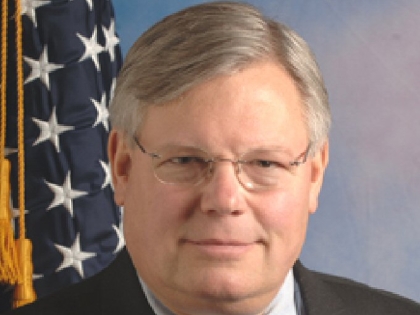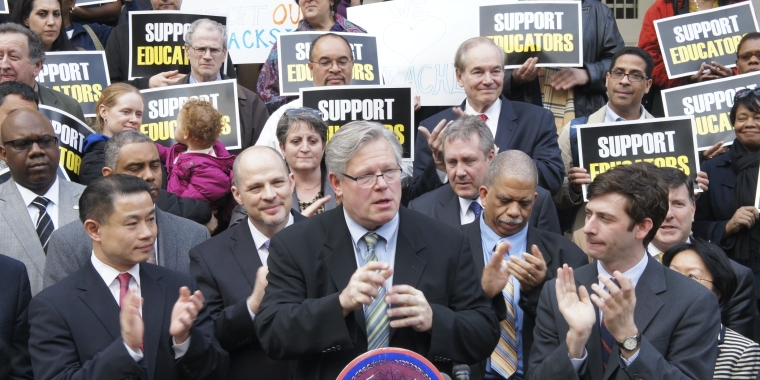
July 2009 Community Report
Thomas K. Duane
July 30, 2009
July 2009 Community Report
Dear Neighbor:
The following is a summary of some of my office's activities since my last community report:
Albany Update
On July 9, the month-long stalemate in the New York State Senate ended. The June 8th coup was a painful and disturbing moment in the history of the Senate and I am committed to working with my colleagues from both sides of the aisle to restore to the Senate decorum, dignity, fairness, and bipartisan collegiality, as well as hard work with real results.
While I am pleased that the Senate crisis is over and that the Democratic Conference remains, as they were elected to be, in the majority, I could not in good conscience demand a vote on critical but controversial bills in the immediate aftermath of the coup. As disappointing as it was to admit, it was very clear to me that this month was not the right moment to take up legislation that strengthens tenant protections, safeguards reproductive health rights, grants marriage equality to all New Yorkers, protects transgender people from discrimination, and many more key issues. Members' emotions were raw, feelings were hurt and trust had been lost. It will take time for these wounds to heal.
This is not an excuse for inaction. I refuse to be put off for long. During the weeks and months ahead the Senate will be called back to Albany to deal with a range of issues and I will fight to ensure that these essential bills, which impact the lives of all New Yorkers, come to the floor for a vote and pass in 2009.
While these important but controversial bills were not on the agenda when the Senate gaveled into session on July 9, 15 and 16, the Senate did go to work on hundreds of bills vital to New Yorkers’ economic, physical and social well-being. There are several bills that passed about which I am particularly proud:
- The Senate enacted rules reform to change the way the Senate conducts its business. Among the key reforms are rules that allow any member to bring a bill to the floor with the backing of three-fifths of the chamber, term limits of eight years for majority and minority leaders and committee chairs, the ability to hold hearings on bills with the support of one-third of a committee’s members, webcasting of committee meetings and hearings and broadcasting, similar to C-SPAN, of session and joint committee hearings. Further, staff and resources will be divided up equally to ensure that all New Yorkers receive the constituent services and representation they deserve.
- A bill I care deeply about, which will ensure that some of New York’s poorest residents with HIV/AIDS pay no more than 30% of their income towards their rent, passed the Senate 52 to 1 during the final hours of session. This much needed legislation brings the New York City HIV/AIDS Service Administration’s housing program into line with New York’s other enhanced rent assistance programs. Fearing that the Republicans would vote in a block to defeat the bill, I gave a passionate speech about the history of the AIDS epidemic and the ongoing discrimination and stigmatization faced by those living with HIV/AIDS. The bill now must pass through the State Assembly and I will continue to fight until this much needed legislation becomes law.
- Legislation I sponsored enabling New York City to implement a $3 million biotech tax credit passed unanimously and now awaits the Governor’s signature. The tax credit, proposed by New York City Council Speaker Christine Quinn, is designed to work with New York State's Qualified Emerging Technologies Credit to encourage small biotech companies to bring their jobs, innovation and new technology to the City.
- As chair of the Senate Health Committee, I was extremely pleased to be able to pass a number of significant pieces of health legislation. The Family Health Care Decisions Act grants medical decision-making authority to loved ones of incapacitated patients who do not have a health care proxy or other advance directive. The Nursing Care Quality Protection Act requires nursing homes and hospitals to disclose their nurse staffing ratios so that patients and their families will be able to receive quality care from qualified nurses. And my bill that requires the New York State Department of Health to study the quality of care given to state prisoners with HIV, AIDS, or Hepatitis C will improve the health of prison inmates as well as the those in the communities to which they return.
There is still far more work that the Senate must do this year. As of the time of this writing it is expected that the Senate will return to the Capitol in September. I will continue to fight to ensure that we move a progressive agenda that will better the lives of all New Yorkers.
Promoting Better School Governance
Since the start of this year, I have participated in numerous meetings and discussions with parents, teachers, principals and education advocates on whether the New York State Legislature should renew the so-called “Mayoral Control Law” which expired on June 30, 2009. While certainly Mayoral Control led to some improvements in New York City’s public school system, it was clear to me from both my conversations and my work with stakeholders in my district's schools that the law must be amended to enhance parental input, independent oversight and transparency.
I have no doubt that many of the issues that we have struggled with in 29th Senate District schools – including overcrowding across the district, the elimination of cluster rooms at P.S. 11 and other schools, the shortage of pre-kindergarten seats at P.S. 3 and P.S. 41, and the slow and insufficient response to the presence of PCBs at P.S. 199 – could have been prevented if parents and other stakeholders had a venue to be heard in the school governance process.
On July 17, I was one of 15 members of the New York State Senate who voted for “The Better Schools Act,” an alternative school governance bill that would enhance Mayoral Control of New York City’s public schools by expanding the Panel for Educational Policy and giving its members fixed terms, creating a Parent and Student Training Center to facilitate their involvement in the schools, and giving authority to New York City’s Comptroller to audit the Department of Education (DOE) and to New York City’s Independent Budget Office to issue reports on DOE finances and student performance. While this bill failed, I will continue working to ensure that the Senate passes a school governance bill that includes a stronger voice for parents and greater accountability to all stakeholders.
Expressing Concerns about NYCHA’s 2010 Draft Annual Plan
Please see the testimony I submitted at the June 23 New York City Housing Authority (NYCHA) public hearing on its 2010 Draft Annual Plan. As the representative of six NYCHA developments, including Amsterdam Houses and Amsterdam Addition, I had particular concerns about some of the deficit reduction proposals in the plan. I also expressed concerns that the Draft Annual Plan does not go far enough to aid NYCHA residents in light of the City's deepening economic crisis.
Seeking a Contextual Ventilation Facility at Mulry Square
On July 20, the West Village's other local elected officials joined me in writing to MTA New York City Transit (NYCT) to express our disappointment that none of the design options the agency has presented for its Emergency Ventilation Facility Project at Mulry Square (61 Greenwich Avenue at Seventh Avenue South) are contextual to Greenwich Village Historic District in which it is located. We also echoed CB2’s requests that NYCT submit its plans to the New York City Landmarks Preservation Commission and secure a professional with experience in designing memorials to appropriately incorporate the September 11 Memorial Tiles. Please see our letter.
Calling for a District 3 Priority High School
Please see the statement I submitted at the New York City Department of Education's June 11 public meeting on the creation of a new school or schools on the Louis D. Brandeis campus. I joined many Community School District 3 (D3) parents, Community Education Council members, advocates and other elected officials in expressing support for the proposed Frank McCourt High School for Journalism, Writing, and Literature, an academically rigorous, D3 priority high school designed to promote creative and expository writing, reporting, literary criticism, and other communications arts in the context of the digital age.
Continuing to Collaborate with the Department of Education
On July 10, I joined NYC Council Speaker Christine Quinn and other local elected officials in writing to the NYC Department of Education to outline, and request a plan of action for, a number of immediate and long-term needs surrounding school overcrowding and other issues in Greenwich Village and Chelsea schools. We will continue to work with DOE to ensure that these issues are addressed in a public and timely manner. Please see our letter.
Honoring Jane Jacobs
On July 13, I had the pleasure of attending the renaming of Hudson Street at West 11th Street in honor of Jane Jacobs. As you know, Jane Jacobs was a one-of-a-kind community advocate who was not afraid to confront conventional urban planning wisdom and effectively fight for her lively and vocal West Village neighborhood. The guest of honor at the street renaming was our very own Doris Diether, one of Jane Jacob’s co-conspirators, who carries on her legacy of fighting for contextual and human-sized development in our neighborhoods.
Participating in a Helicopter Noise Symposium
On July 2, while I was in Albany, my staff participated in the Federal Aviation Administration’s Symposium on New York City Helicopter and Float Plane Operations. The Symposium, which was held at U.S. Representative Jerry Nadler’s request, addressed the root causes of helicopter noise?from flight paths to rotary engineering – and possible mitigations. I will continue to work with my colleagues in government, community advocates and other stakeholders to eliminate this persistent nuisance.
Share this Article or Press Release
Newsroom
Go to NewsroomHonoring NYPD Officer Moira Smith
March 12, 2012
Rallying to Support Public School Teachers
March 9, 2012

Monitoring Implementation of NYC Bike Share
March 2, 2012
Seeking Local Veto-Power over DOE-Proposed School Co-Locations
February 29, 2012